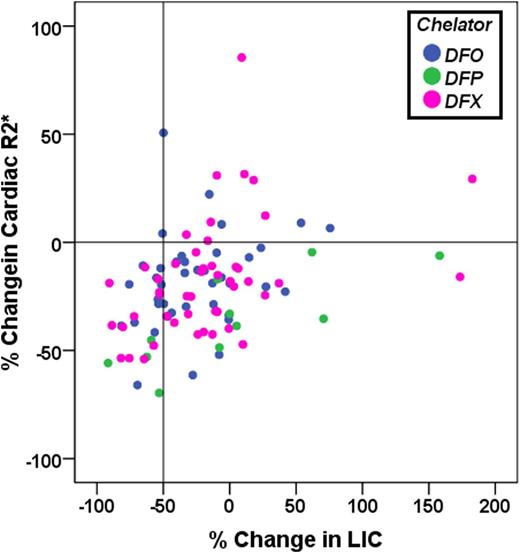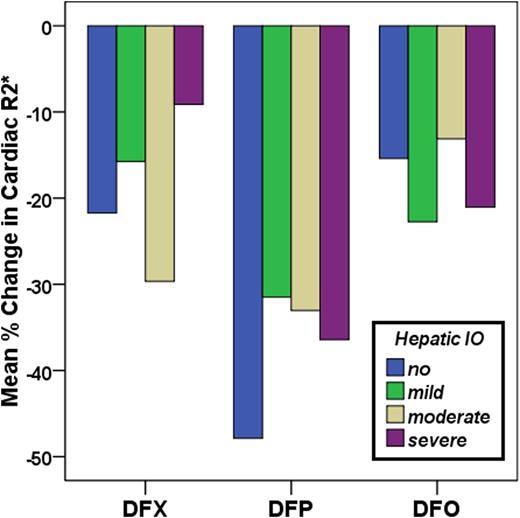Abstract
Introduction. The aim of this multicenter study was to evaluate in thalassemia major (TM) if the cardiac efficacy of the three iron chelators in monotherapy was influenced by hepatic iron levels over a follow up of 18 months.
Methods. Among the 2551 TM patients enrolled in the MIOT (Myocardial Iron Overload in Thalassemia) network we evaluated prospectively the 98 patients those with an MR follow up study at 18±3 months who had been received one chelator alone between the 2 MR scans and who showed evidence of significant cardiac iron (global heart T2*<20 ms) at the basal MRI. Iron overload (IO) was measured by T2* multiecho technique. We used cardiac R2* (equal to 1000/T2*) because cardiac R2* is linearly proportional to cardiac iron and hepatic T2* values were converted into liver iron concentration (LIC) values.
Results. We identified 3 groups of patients: 47 treated with deferasirox (DFX), 11 treated with deferiprone (DFP) and 40 treated with desferrioxamine (DFO).
Percentage changes in cardiac R2* values correlated with changes in LIC in both DFX (R=0.469; P=0.001) and DFP (R=0.775; P=0.007) groups. All patients in these 2 groups who lowered their LIC by more than 50% improved their cardiac iron (see Figure 1).
Percentage changes in cardiac R2* were linearly associated to the log of final LIC values in both DFX (R=0.437; P=0.002) and DFP groups (R=0.909; P<0.0001).
Percentage changes in cardiac R2* were not predicted by initial cardiac R2* and LIC values.
In each chelation group patients were divided in subgroups according to the severity of baseline hepatic iron overload (no, mild, moderate, and severe IO). The changes in cardiac R2* were comparable among subgroups (P=NS) (Figure 2).
Conclusion. In patients treated with DFX and DFP percentage changes in cardiac R2* over 18 months were associated with final LIC and percentage LIC changes.
In each chelation group percentage changes in cardiac R2* were no influenced by initial LIC or initial cardiac R2*.
Pepe:Chiesi Farmaceutici and ApoPharma Inc.: Other: Alessia Pepe is the PI of the MIOT project, that receives no profit support from Chiesi Farmaceutici S.p.A. and ApoPharma Inc..
Author notes
Asterisk with author names denotes non-ASH members.



